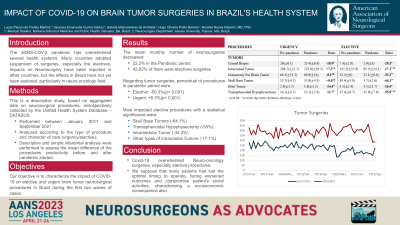Impact of Covid-19 on Brain Tumor Surgeries in Brazil's Health System
Impact of covid-19 on Brain Tumor Surgeries in Brazil's Health System
Friday, April 21, 2023

.jpeg.jpg)
Lucas Piason Martins, MD
Medical Doctor
Bahiana School of Medicine and Public Health, Brazil
Salvador, BA, Brazil
ePoster Presenter(s)
Introduction: The SARS-COV-2 pandemic has overwhelmed several health systems around the world, making it necessary to reduce some medical activities to meet the demand for hospitalizations by COVID-19 and avoid the intire collapse. Suspension of surgeries had been adopted in many countries, especially the electives. Impacts on Neurosurgery have been reported in other countries, but the impacts in Brazil have not yet been explored, especially in the neuro-oncology field. Our objective is to characterize the impact of COVID-19 on elective and urgent brain tumor neurosurgical procedures in Brazil during the first two waves of cases.
Methods: This is a descriptive study, based on aggregated data on neurosurgical procedures performed between January 2017 and September 2021. retrospectively collected by the Unified Health System Database-DATASUS. Data were analyzed according to the type of procedure and character of care (urgency/elective). Descriptive and simple inferential analysis were performed to assess the mean difference of the procedures productivity between the pre-pandemic and pandemic period.
Results: The avarege number of Neurosurgical procedures in the Brazilian public health system was 8,787.4 per month before Covid-19 had emerged, of which, 41,8% were electives and 58,2% urgent procedures. The mean monthly number of neurosurgeries decreased 22,2% in the Pandemic period. This dropdown is especially seen with electives surgeries (-42,82%). Regarding tumor surgeries, the elective procedures before the pandemic period had a mean number of procedures of 242.5(±17.5), and turned to 188.3(±22.7), a a decrease of 22.9%(p < 0,001). Nevertheless, the urgent procedures showed a grown of 6.3%(p < 0,001). The most impacted elective procedures with a statistical significance were Skull Base tumors (-64.1%), Transphenoidal Hypophysectomy (-55%) and other types of intracranial tumors (-17.1%).
Conclusion : Covid-19 overwhelmed Neuro-oncology surgeries, specially elective procedures. Based on our findinds, we suppose that many patients had a lost the optimal timing to operate, facing worsened outcomes as an unfortunate consequence.
Methods: This is a descriptive study, based on aggregated data on neurosurgical procedures performed between January 2017 and September 2021. retrospectively collected by the Unified Health System Database-DATASUS. Data were analyzed according to the type of procedure and character of care (urgency/elective). Descriptive and simple inferential analysis were performed to assess the mean difference of the procedures productivity between the pre-pandemic and pandemic period.
Results: The avarege number of Neurosurgical procedures in the Brazilian public health system was 8,787.4 per month before Covid-19 had emerged, of which, 41,8% were electives and 58,2% urgent procedures. The mean monthly number of neurosurgeries decreased 22,2% in the Pandemic period. This dropdown is especially seen with electives surgeries (-42,82%). Regarding tumor surgeries, the elective procedures before the pandemic period had a mean number of procedures of 242.5(±17.5), and turned to 188.3(±22.7), a a decrease of 22.9%(p < 0,001). Nevertheless, the urgent procedures showed a grown of 6.3%(p < 0,001). The most impacted elective procedures with a statistical significance were Skull Base tumors (-64.1%), Transphenoidal Hypophysectomy (-55%) and other types of intracranial tumors (-17.1%).
Conclusion : Covid-19 overwhelmed Neuro-oncology surgeries, specially elective procedures. Based on our findinds, we suppose that many patients had a lost the optimal timing to operate, facing worsened outcomes as an unfortunate consequence.
